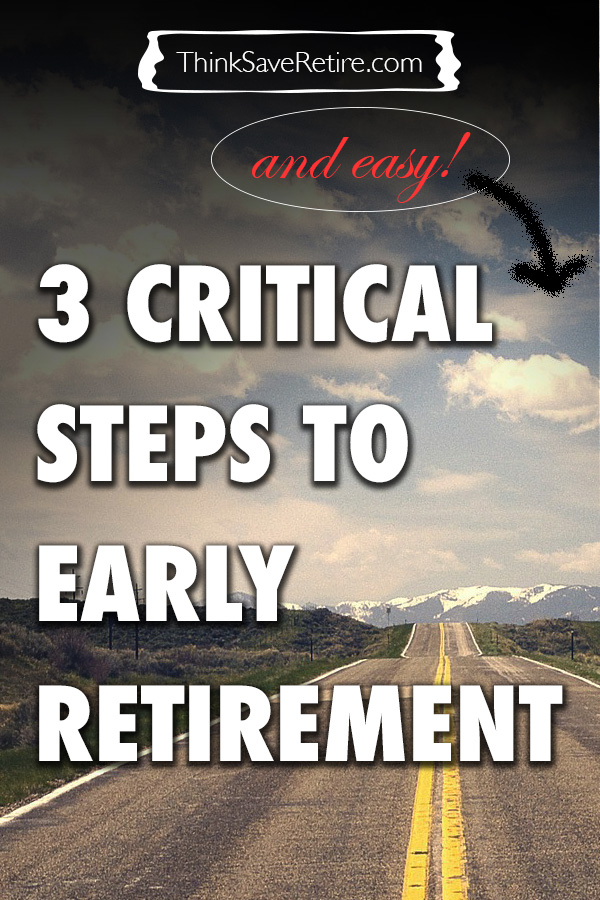The 3 most critical steps to retire early
Things are happening quickly for us and I think that I have begun taking for granted just how important some of these changes have been in setting us up for early retirement. Truth is, we're on track to beat our goal, and it is definitely wise for me to keep my eye on what is getting us here.

Financially speaking, there's a whole lot of goodness that has gone down in our household over the past year. I mean, seriously life-altering shit that prepared my wife and me to achieve financial independence and retire before I reached the age of 40 36 35.

Things are happening quickly for us and I think that I have begun taking for granted just how important some of these changes have been in setting us up for early retirement. Truth is, we're on track to beat our goal (we did, by a long shot), and it is definitely wise for me to keep my eye on what is getting us here.
Of all the changes that my wife and I have made, I have taken the liberty of distilling them down into three main core areas of badassery that are driving us forward down this path to jobless bliss. It goes something like this:
- First, we decided to prioritize (read: give a shit about) our future.
- Second, we began saving nearly 70% of our combined income.
- And third, my wife and I are open and honest about our financial situation and talk about our future almost every day.
Pretty easy, huh? In truth, these changes were easy. It is interesting how natural it is to settle down into a new routine, even if that routine is frugality and minimalism sensiblism.
Let's talk about each.
We decided to prioritize our future
In an earlier life, it was way the hell too easy for me to drop piles of cold hard cash on stupid shit that I thought would bring me oodles of happiness. Like the Corvette I bought less than a year out of college. Or the brand new Cadillac CTS I bought five years ago. Or those sport bike motorcycles that served as my way of satisfying my need for hardcore adrenaline.
I was making good money, and I could afford it - I thought.
I wasn't a horrible spender on the little things. Instead of buying a lot of the small stuff (like models, computer equipment, expensive soaps or detergents and what-not), I instead bought fewer of the larger items, like those described in the previous paragraph. I loved my toys, baby! And honestly, I'm not even a "car guy". In fact, I don't particularly like to drive and abhor traffic.
Yeah, try and figure that one out. The math totally doesn't compute. Why did I spend so much money on cars if I don't like to drive? Don't ask, 'cause I have no idea.
Once my wife and I decided to retire early, we immediately nixed the majority of spending on our present selves and began prioritizing the overall happiness and excitement of our future. The changes we made include:
- Hardly spending any cash on anything that isn't critical to our livelihoods
- We no longer have an expensive cable television package
- We don't have unlimited data cell phone plans (actually, we did buy a grandfathered Verizon unlimited data plan that serves as our only means of Internet connectivity)
- We don't drive unless necessary
Oh, and we keep a fairly strict budget, and we record how well we managed them online from month to month. For example:
- We keep our food spending to $300/month for groceries and around $50 for restaurants
- Both my wife and I have a small "fun money" pot, but it is rare when either of us spends it all
- We consider budgeted money to be the upper limit of spending; in other words, we certainly don't HAVE to spend it all each month. In fact, aside from our food budget, we rarely run our budget categories dry
Contrary to popular belief, budgeting is easy.
We are saving 70% of our combined income
Sadly, the majority of Americans save in the neighborhood of 5% of their income each year. And unfortunately, Americans may read stupidly-pessimistic financial articles, like this one published in Fortune (yes, "Fortune"), that all but gives up on the entire notion of saving big and acquiring substantial wealth.
In truth, my wife and I are both proof that saving a large percentage of your income is not only possible in this economy, but flat out easy. Both my wife and I work, and we save her entire salary along with a good portion of mine. Together, we save close to 70% of our total combined income.
And guess what? We don't live in some cardboard box either. We don't drive rusty and broken down cars. We don't deprive ourselves of the little things in life that supposedly "make us happy". We still "live a little", just like the majority of Americans. The difference? We only "live a little"...a little!
On the contrary, we live in the lap of fucking luxury. We inhabit a 1600 sqft home (now a 200 square foot Airstream) with central air conditioning and heat with a pool in the backyard with a beautiful glass-sharded gas-powered fire pit. My wife drives a Cadillac CTS and I drive a Honda VTX 1300c motorcycle (now just a Dodge RAM 2500HD). We have two rescued dogs, both adorable as hell.
We watch a nice 46" flat panel Sony Bravia television every night while we eat dinner (now a Chromebook). We make substantial meals consisting of beans and veggies, rice, tofu, sausage, tortillas, potatoes, guacamole and a variety of other ingredients. We often wash it down with a glass of wine (or, in my case, a vodka tonic or beer), margarita, sangria or some other alcoholic beverage.
We sleep in a gigantic king-sized bed (Now? Hah!). The walls of our home are covered in [my] photography and [not my] art pieces. I work from home with two 27" flat screen monitors and a laptop (wait, work?). We also have two different Macbook Pros that my wife and I use for fun and writing purposes.
Hardly poverty.
My wife and I save close to 70% of our income and enjoy a life that probably beats 90% of the worldly population as measured by access to, and ownership of, pure luxury. And we have "Fortune" authors like Stephen Gandel lecturing readers on how only the lucky or fortunate can save 14% or more of their income?
Hogwash! Saving money - even a substantial portion of your income, is not difficult. It only demands an adherence to the "future" principle that I talked about above. Prioritize your future self and saving your dough becomes almost automatic. You might be surprised at how little that you actually need to live your life - even, as I wrote about above, in luxury.
We openly talk about our future every day
My wife and I keep our eye on the prize. Every. Single Day. During the spring and summer, we walk our dogs every evening after dinner and, naturally, talk about our future comes up. We bat ideas back and forth. We talk about our budget and what tweaks can be made to squeeze a little bit extra out of it. We discuss both our short term and long term goals openly and honestly, and we do it almost every day.
Communication is critical in every relationship regardless of retirement plans. But, this kind of communication becomes even more important when the stakes are higher. The truth is both my wife and I would like to spend more than half of our lives living happily and comfortably without a job, and this sure as hell demands conversation.
We like it. One of the reasons why plans for our future keep coming up when we're walking our dogs is because we enjoy the journey. Every day that we get closer to our dream is an accomplishment that was made possible not by some "ingenious" plan to retire early, but with the understanding that our future is more important than our present.
To us, working is a means to an end, nothing more. Our jobs do not simply provide us with the resources to aimlessly meander our way through our lives, working straight up until the average retirement age in the United States that has risen, amazingly, into the low 60s. Instead, our jobs are how we achieve our goals of early retirement; of traveling full-time throughout this beautiful country of ours - that most of us Americans never see.
It is important to note: much to the contrary of what our mothers would have us believe, there is nothing "special" about my wife or I. We are normal Americans with access to the same resources as everybody else. Where we differ from the majority is in the path that we have taken to maximize happiness.
It is not a tough journey, either. In fact, in many ways spending less money and acquiring fewer things in life makes your job of living much, much more simple and straightforward. I like simplicity. I like things being easier than they might otherwise be.
I like it when things just "work", and the less that I have to maintain and pay for, the more likely things are to simply work.
Oh, and we aren't the only ones who are turning our dreams of early retirement into reality, either. Miss Mazuma is doing it, just like Our Next Life. So is the Gen Y Finance Guy and Chris over at Money Mozart. 1500 Days is on top of it too, as is Zee from Work To Not Work. Check out Jason from Free at 33 who is practically a wizard at dividend investing and has long since retired. We are all normal Americans living in this wonderful country of ours who have chosen a much different path towards retirement.
The quicker one.
What about you? How do you manage to turn your goals into reality?
Note: This article was originally published in April of 2015, but has been updated after my retirement from full-time work last December.